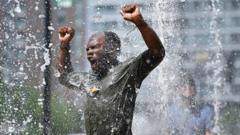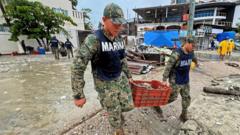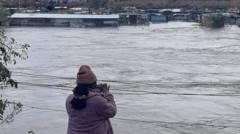In Karachi, extreme heat has transformed daily life into a relentless struggle for survival, affecting not just the individual but entire families and communities.
Surviving the Inferno: Everyday Life in Karachi's Scorching Heat

Surviving the Inferno: Everyday Life in Karachi's Scorching Heat
How one Pakistani father navigates the oppressive conditions of his city while providing for his family.
Shahbaz Ali, a 32-year-old motorcycle driver in Karachi, Karachi, Pakistan’s most populous city, illustrates the harsh reality faced by many. With temperatures soaring above 104 degrees Fahrenheit by midday, Ali battles sweat and exhaustion as he rides through congested streets, often for 12 hours a day. The relentless heat and high humidity create a life-threatening heat index, often exceeding 115 degrees Fahrenheit.
“Living in this furnace is a test of endurance,” Ali explains. Despite his weariness from multiple daily power outages, he continues to work tirelessly to provide for his family. His struggle highlights the increasing toll that extreme heat takes on individuals, not only physically but also on their livelihoods.
Ali’s mornings begin before the sun is fully up, but even at 8 a.m., the heat is overwhelming. Power cuts make it challenging for him to ensure his kids complete their schoolwork, forcing him to rely on a rechargeable emergency light during the outages. The storm of heat and societal dynamics reinforces a stark reality: in Karachi, survival often means enduring a relentless climate that makes true living feel out of reach.
As our world grapples with climate change, stories like that of Ali remind us of the human cost associated with extreme weather conditions and how it shapes life in one of the world's most unlivable cities. The government’s response to this crisis continues to be a topic of discussion among residents, who question what future can be expected in such hostile conditions.
“Living in this furnace is a test of endurance,” Ali explains. Despite his weariness from multiple daily power outages, he continues to work tirelessly to provide for his family. His struggle highlights the increasing toll that extreme heat takes on individuals, not only physically but also on their livelihoods.
Ali’s mornings begin before the sun is fully up, but even at 8 a.m., the heat is overwhelming. Power cuts make it challenging for him to ensure his kids complete their schoolwork, forcing him to rely on a rechargeable emergency light during the outages. The storm of heat and societal dynamics reinforces a stark reality: in Karachi, survival often means enduring a relentless climate that makes true living feel out of reach.
As our world grapples with climate change, stories like that of Ali remind us of the human cost associated with extreme weather conditions and how it shapes life in one of the world's most unlivable cities. The government’s response to this crisis continues to be a topic of discussion among residents, who question what future can be expected in such hostile conditions.





















